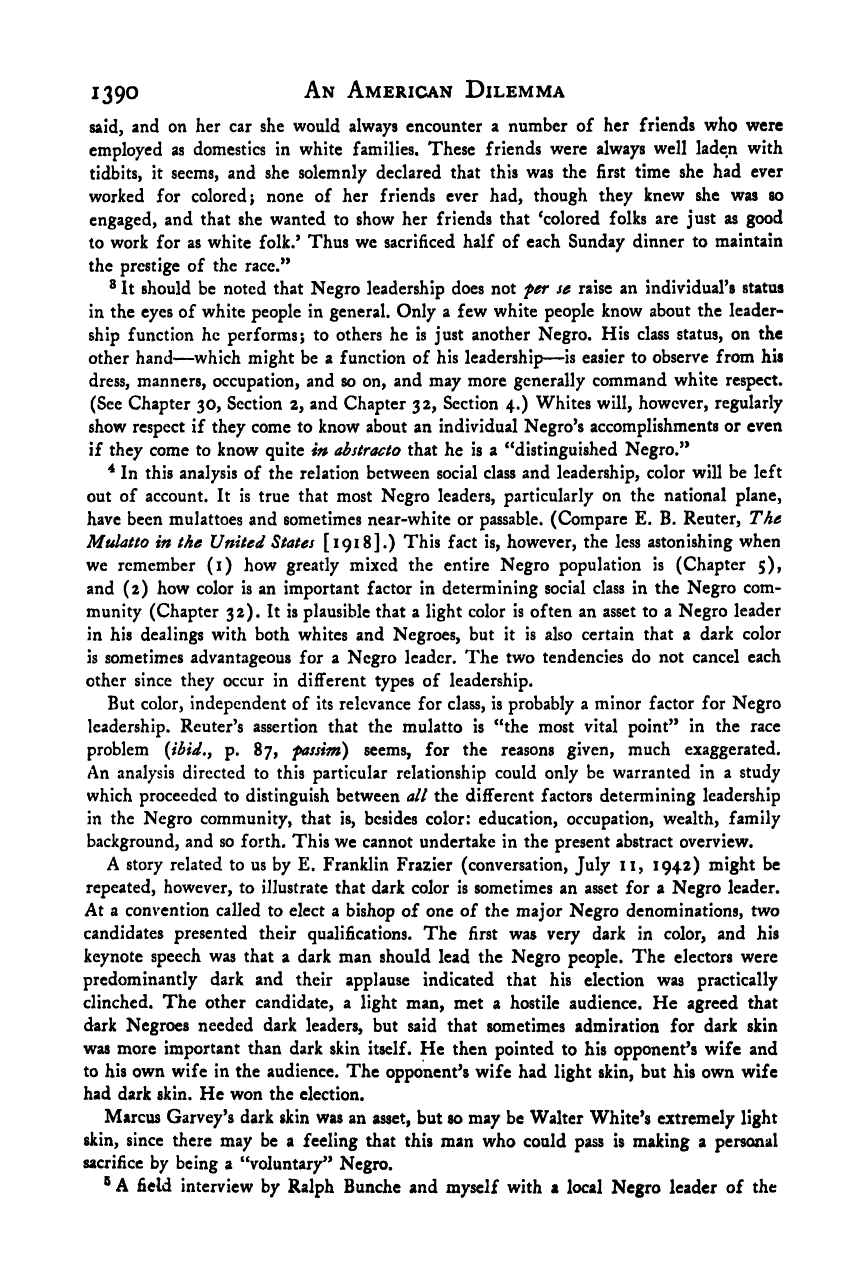Note: Gunnar Myrdal died in 1987, less than 70 years ago. Therefore, this work is protected by copyright, restricting your legal rights to reproduce it. However, you are welcome to view it on screen, as you do now. Read more about copyright.
Full resolution (TIFF) - On this page / på denna sida - Footnotes - Chapter 34

<< prev. page << föreg. sida << >> nästa sida >> next page >>
Below is the raw OCR text
from the above scanned image.
Do you see an error? Proofread the page now!
Här nedan syns maskintolkade texten från faksimilbilden ovan.
Ser du något fel? Korrekturläs sidan nu!
This page has never been proofread. / Denna sida har aldrig korrekturlästs.
1390 An American Dilemma
said, and on her car she would always encounter a number of her friends who were
employed as domestics in white families. These friends were always well laden with
tidbits, it seems, and she solemnly declared that this was the first time she had ever
worked for colored j none of her friends ever had, though they knew she was so
engaged, and that she wanted to show her friends that ‘colored folks are just as good
to work for as white folk.* Thus we sacrificed half of each Sunday dinner to maintain
the prestige of the race.**
® It should be noted that Negro leadership does not fer se raise an individual’s status
in the eyes of white people in general. Only a few white people know about the leader-
ship function he performs; to others he is just another Negro. His class status, on the
other hand—which might be a function of his leadership—is easier to observe from his
dress, manners, occupation, and so on, and may more generally command white respect.
(See Chapter 30, Section 2, and Chapter 32, Section 4.) Whites will, however, regularly
show respect if they come to know about an individual Negro’s accomplishments or even
if they come to know quite in abstracto that he is a “distinguished Negro.’*
^ In this analysis of the relation between social class and leadership, color will be left
out of account. It is true that most Negro leaders, particularly on the national plane,
have been mulattoes and sometimes near-white or passable. (Compare E. B. Reuter, The
Mulatto in the United States [1918].) This fact is, however, the less astonishing when
we remember (i) how greatly mixed the entire Negro population is (Chapter 5),
and (2) how color is an important factor in determining social class in the Negro com-
munity (Chapter 32). It is plausible that a light color is often an asset to a Negro leader
in his dealings with both whites and Negroes, but it is also certain that a dark color
is sometimes advantageous for a Negro leader. The two tendencies do not cancel each
other since they occur in different types of leadership.
But color, independent of its relevance for class, is probably a minor factor for Negro
leadership. Reuter’s assertion that the mulatto is “the most vital point” in the race
problem (ibid,, p. 87, fassim) seems, for the reasons given, much exaggerated.
An analysis directed to this particular relationship could only be warranted in a study
which proceeded to distinguish between all the different factors determining leadership
in the Negro community, that is, besides color: education, occupation, wealth, family
background, and so forth. This we cannot undertake in the present abstract overview.
A story related to us by E, Franklin Frazier (conversation, July ii, 1942) might be
repeated, however, to illustrate that dark color is sometimes an asset for a Negro leader.
At a convention called to elect a bishop of one of the major Negro denominations, two
candidates presented their qualifications. The first was very dark in color, and his
keynote speech was that a dark man should lead the Negro people. The electors were
predominantly dark and their applause indicated that his election was practically
clinched. The other candidate, a light man, met a hostile audience. He agreed that
dark Negroes needed dark leaders, but said that sometimes admiration for dark skin
was more important than dark skin itself. He then pointed to his opponent’s wife and
to his own wife in the audience. The opponent’s wife had light skin, but his own wife
had dark skin. He won the election.
Marcus Garvey’s dark skin was an asset, but so may be Walter White’s extremely light
skin, since there may be a feeling that this man who could pass is making a personal
sacrifice by being a “voluntary” Negro.
® A field interview by Ralph Bunche and myself with a local Negro leader of the
<< prev. page << föreg. sida << >> nästa sida >> next page >>